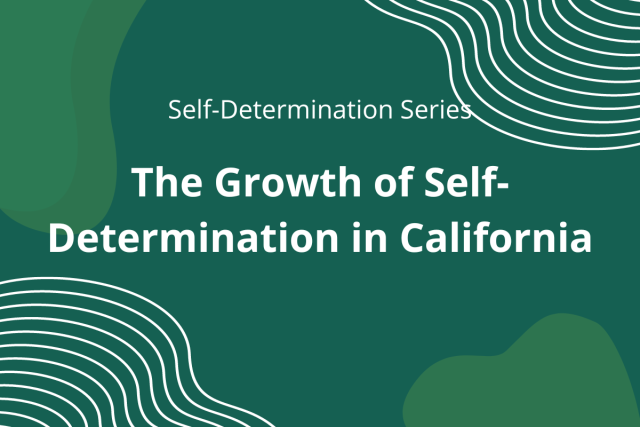The Growth of Self-Determination in California
By Ability Central
21 September, 2022

Born from the desire of disability advocates to implement a more person-centered approach, Self-Determination Programs (SDP) have prospered in the United States. The Self-Determination Program offers a way for disabled individuals to take back their agency and make their own choices with the support of their care team and families.
What is Self-Determination?
The principles of self-determination are founded on universal human rights, the disability justice movement, and supported by regional centers. The principles of self-determination programs include:
- Freedom: The freedom to exercise the same rights as all citizens; to establish, with freely chosen supports, family and friends, where they want to live, with whom they want to live, how their time will be occupied, and who supports them.
- Authority: The authority to control a budget in order to purchase services and supports of their choosing.
- Support: Support, including the ability to arrange resources and personnel, which will allow flexibility to live in the community of their choice.
- Responsibility: Responsibility, which includes the opportunity to take responsibility for making decisions in their own lives and accept a valued role in their community.
- Confirmation: Confirmation in making their own decisions in their own lives by designing and operating the service that they rely on.
California Embraces the Self-Determination Program
In October of 2013, Governor Edmund G. Brown signed the Self-Determination Program into law. The goal of the program is to provide individuals and their support networks more flexibility, autonomy, and say over their support services. Disabled individuals and their families will be able to create and follow through with objectives in their Individual Program Plan. Each plan is customized by the disabled person and their team.
To accommodate the shift toward SDPs, the Department of Developmental Services created a 3-year implementation period. During this period, the program was offered to 2,500 individuals for the pilot group. Each region had a select number of consumers to participate in the program.
The pilot's success grew into state-wide support. Starting July 1st, 2021, SDP became available for all eligible regional center clients. Each regional center develops a committee of folks to ensure the effective execution. These local advisors range from family members, disabled clients, disability advocates, and community members. The local advisory committee reflects a diverse, intersectional, and multicultural group of people who aim to develop service plans and connect people with providers.
Tim Jin, a board member at Ability Central, has valued what the Self-Determination Program offered him.
"I now have the choice of who I want to hire and how I want to be helped," said Tim. "I'm no longer restricted to a company's (agency) policy of who can help me as long as they can pass the background check and are reliable. For the past 20 years, I needed to get permission from an agency for staff to take me to family gatherings, going to concerts, etc. Everything needed to be preplanned and approved due to overtime and the company's policy of who can drive me. Also, I got many random staff to help me throughout my day. It felt very institutionalized even in my own home.
"Now that I'm in Self Determination, I feel that my life is ordinary. For example, I am able to set up my own schedule for staff and coordinate with them directly what I need to be done, instead of asking someone at an agency. Last night, I had tickets to go to a concert. I just needed to arrange it with my staff to take me and just budget in overtime for them. We had a great time at the show."
Local Community Responds with Support and Understanding
Local community members in California have come together to support and integrate these programs through regional centers. Allies in the workforce can also accommodate individuals with disabilities as they come to understand their access needs. The SDP provides a bridge to the local community. From cooking instructors and guitar lessons to care providers and therapists, Person-Centered Plans (PCPs) offer connections for disabled individuals.
Places like Mondo's Coffeehouse in Chico, California, have fully embraced and welcome individuals from the Far Northern Regional Center. Mondo's Coffeehouse offers the opportunity to nurture public socialization skills, foster independent living, and develop employment skills, demonstrating the importance of community participation in creating inclusive spaces.
Other folks are happy to host recreational activities for consumers with developmental and intellectual disabilities. These range from day programs for scrapbooking to trips to the salon. PCPs may include home-based support activities that accommodate sensory needs, like dancing, music, aromatherapy treatments, or reading.
For Tim Jin, the path to SDP was a source of relief and understanding.
"No doubt, I will never be going back to the broken (traditional) system again," says Jin. "I should have started sooner!"
When it comes to self-determination in California, the possibilities are as varied and vast as the individuals in the program. This alternative recenters the focus from fitting into ready-made programs for people with disabilities back where it belongs—to the choice of the disabled person
Learn more about self-determination by exploring our 4-part Self-Determination Series.
Exploring the Self-Determination Program in The United States
The Growth of Self-Determination in California
Person-Centered Planning in the Self-Determination Program
Self-Determination Program and the Financial Management Services Provider